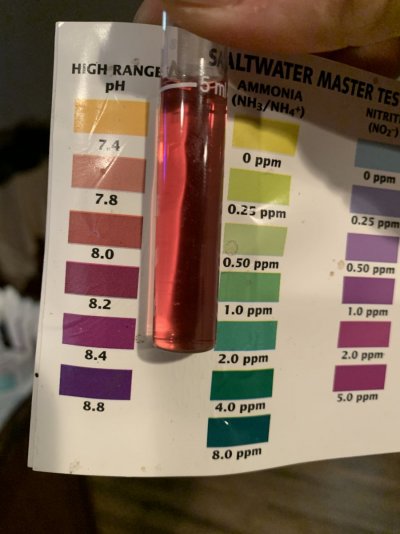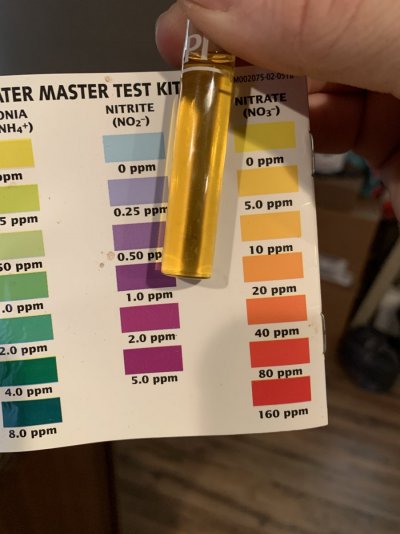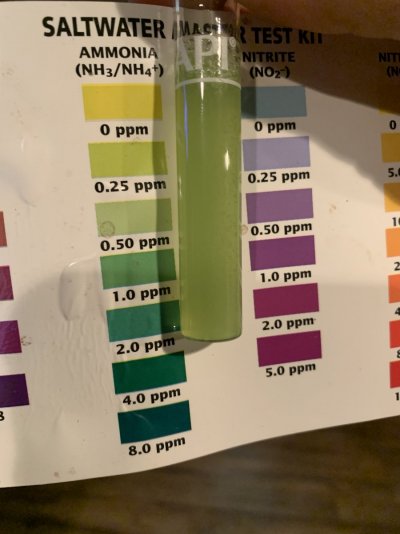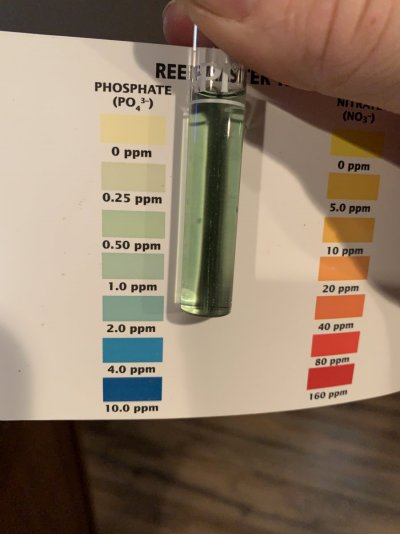Need help with bringing my calcium up it’s testing at like 380 and from what I understand I need to be in the 420-440 range
Navigation
Install the app
How to install the app on iOS
Follow along with the video below to see how to install our site as a web app on your home screen.
Note: This feature may not be available in some browsers.
More options
You are using an out of date browser. It may not display this or other websites correctly.
You should upgrade or use an alternative browser.
You should upgrade or use an alternative browser.
Parameters
- Thread starter CaseyWalker
- Start date
- Tagged users None
Reef master test kit and 240g display with 80g sump
Attachments
Need help with bringing my calcium up it’s testing at like 380 and from what I understand I need to be in the 420-440 range
380 is fine. Tell us more about your tank such as age, types of corals, other parameters if you want more help.
Those test was right before a water change last week Ill redo shortly and repostLooks like you have ammonia in your tank. Is this a new tank that is in the process of cycling?
1.5 year old and all my parameters are posted but I’m gonna repost them shortly those was taken right before a water change380 is fine. Tell us more about your tank such as age, types of corals, other parameters if you want more help.
Randy Holmes-Farley
Reef Chemist
View Badges
Staff member
Super Moderator
Excellence Award
Expert Contributor
Article Contributor
R2R Research
My Tank Thread
- Joined
- Sep 5, 2014
- Messages
- 67,073
- Reaction score
- 63,404
1.5 year old and all my parameters are posted but I’m gonna repost them shortly those was taken right before a water change
Makes it much easier if you post the numbers, not pictures.
An alkalinity value is also essential for a reef aquarium.
There shouldn't be detectable ammonia in your tank if it is 1.5 years old unless something large died. Especially in such a large tank. I would suspect a testing error.1.5 year old and all my parameters are posted but I’m gonna repost them shortly those was taken right before a water change
With regard to the original question of calcium, if you started with a salt that had Ca say at 420, and did not do any water changes, you would see your numbers decrease as it got consumed by your corals and such.
If you were doing regular water changes, your Ca will still drop over time (just not quite as fast) as water changes alone will be unable to keep up with Ca consumption (assuming you have corals). If you were using salt with elevated parameters (ala IO Reef Crystals), you might be able to keep up with larger water changes.
That being said Ca @ 380 is within a reasonable range. However, many reef keepers like to keep Ca higher.
As mentioned, Ca should be kept in balance with Alk (and other parameters).
The API test kit you are using isn’t the ideal test kit for keeping a reef tank. As mentioned above, you need to test alkalinity in addition to calcium. Also, most reefers don’t measure ammonia once the tank is cycled unless you suspect a problem. With API, it is common to get an ammonia reading of 0.25 ppm when the actual reading is 0ppm.1.5 year old and all my parameters are posted but I’m gonna repost them shortly those was taken right before a water change
We do need to know more about what you have in your tank before we can give you any advice that is worthwhile.
Last edited:
Nothing crucial as I’m coming back from a crash I’m 6 months to the good with parameters not fluctuating so fish only with a couple dozen mushrooms, a plate fungi and inverts such as shrimp hermit crabs snails and one urchinThe API test kit you are using isn’t the ideal test kit for keeping a reef tank. As mentioned above, you need to test alkalinity in addition to calcium. Also, most reefers don’t measure ammonia once the tank is cycled unless you suspect a problem. With API, it is common to get an ammonia reading of 0.25 ppm when the actual reading is 0ppm.
We do need to know more about what you have in your tank before we can give you any advice that is worthwhile.
With that type of coral load, I would just watch your calcium uptake. As long as it stays stable, no need to start dosing. If you intend to start adding more/harder corals, I would recommend investing in Salifert or RedSea test kits for Alk,CALC,Mag, and NO3. You should also consider a refractometer for salinity if you aren’t already using one and keep your calibration fluid fresh. . I would recommend the Hanna ULR PO4 checker as well. The only other thing I would recommend for now is to use a salt mix that has roughly the levels you are looking to keep. This will make water changes much easier as you venture into more corals.Nothing crucial as I’m coming back from a crash I’m 6 months to the good with parameters not fluctuating so fish only with a couple dozen mushrooms, a plate fungi and inverts such as shrimp hermit crabs snails and one urchin
I have salinity checker it’s been at 1.25 since I started and ph has always been 8.0-8.2 only thing I have recently change is I recently purchased a media reactor for phosphate and I run seagel which is for phosphate and carbon and the mushrooms are about the size of .50 pieceWith that type of coral load, I would just watch your calcium uptake. As long as it stays stable, no need to start dosing. If you intend to start adding more/harder corals, I would recommend investing in Salifert or RedSea test kits for Alk,CALC,Mag, and NO3. You should also consider a refractometer for salinity if you aren’t already using one and keep your calibration fluid fresh. . I would recommend the Hanna ULR PO4 checker as well. The only other thing I would recommend for now is to use a salt mix that has roughly the levels you are looking to keep. This will make water changes much easier as you venture into more corals.
The type of testers you are using matter. Is the salinity checker a hydrometer, refractometer or something else? Also, ph and Alk are two different things. To keep any type of stony coral, ie plate corals, hammers, acros you need to test for Alk.I have salinity checker it’s been at 1.25 since I started and ph has always been 8.0-8.2 only thing I have recently change is I recently purchased a media reactor for phosphate and I run seagel which is for phosphate and carbon and the mushrooms are about the size of .50 piece
It’s an ATC refractometerThe type of testers you are using matter. Is the salinity checker a hydrometer, refractometer or something else? Also, ph and Alk are two different things. To keep any type of stony coral, ie plate corals, hammers, acros you need to test for Alk.
There shouldn't be detectable ammonia in your tank if it is 1.5 years old unless something large died. Especially in such a large tank. I would suspect a testing error.
With regard to the original question of calcium, if you started with a salt that had Ca say at 420, and did not do any water changes, you would see your numbers decrease as it got consumed by your corals and such.
If you were doing regular water changes, your Ca will still drop over time (just not quite as fast) as water changes alone will be unable to keep up with Ca consumption (assuming you have corals). If you were using salt with elevated parameters (ala IO Reef Crystals), you might be able to keep up with larger water changes.
That being said Ca @ 380 is within a reasonable range. However, many reef keepers like to keep Ca higher.
As mentioned, Ca should be kept in balance with Alk (and other parameters).
To up your Ca, any 2-part comes with an Alk and Ca components. Adjust your levels with testing and then do balanced dosing.
For my tank, I'm just dosing Kalkwasser, which is a balanced supplement that also raises pH.
Thanks sorry for all the confusion just trying to learn and quit throwing money away in the hobbyTo up your Ca, any 2-part comes with an Alk and Ca components. Adjust your levels with testing and then do balanced dosing.
For my tank, I'm just dosing Kalkwasser, which is a balanced supplement that also raises pH.
Thanks sorry for all the confusion just trying to learn and quit throwing money away in the hobby
Yeah. This hobby can be a money pit. Since you received a lot of testing advice, here are a couple thoughts...
You only really need to test what you plan on controlling.
Once you have everything dialed in and your maintenance routine, you typically don't need to test much.
With smaller tanks, it's very easy to do large water changes to help maintain optimal parameters. On larger tanks, you typically have to dose Ca/Alk. However, Ca is used in much less quantity then Alk. So you really just need to get your Alk/Ca to a spot you like; say like 9dKH and 420ppm and just monitor Alk to adjust dosing as consumption changes. It should also be noted that Ca tests are not as easy to perform and prone to being inaccurate.
So if you want to minimize costs, get your water tested at LFS to dial in parameters and just invest in an Alk Tester. I recommend Hanna Alk Tester.
Last edited:
Similar threads
- Replies
- 26
- Views
- 1,052
- Replies
- 3
- Views
- 223
- Replies
- 6
- Views
- 505
- Replies
- 10
- Views
- 306
New Posts
-
Aquarium Controller Powerheads LED Drygoods Mp 40 s 60 s gen 5 blue apex controller
- Latest: Reefing.with.Rich
-
-






















